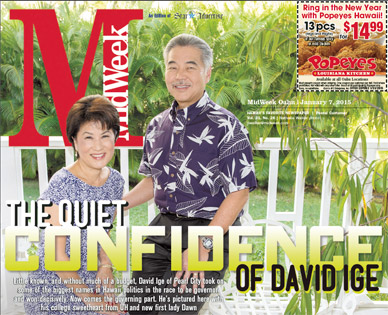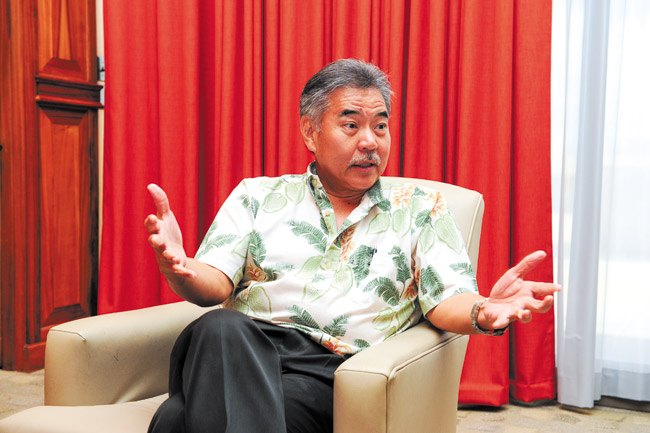The Quiet Confidence Of David Ige
Little known, and without much of a budget, David Ige of Pearl City took on some of the biggest names in Hawaii politics in the race to be governor, and won decisively. Now comes the governing part
mw-cover-010714-david-ige-nwhero-2
Eighteen months ago, few outside of the state Capitol knew David Ige’s name. Yet on July 9, 2013, Ige announced that he would challenge the well-funded and much better-known incumbent, Gov. Neil Abercrombie.
“I was surprised,” says state Sen. Jill Tokuda. “It was so unexpected, so un-David Ige-like. But it was a good surprise for me. It’s always satisfying to see friends that you believe in break out of their boxes and attempt something else.”
Ige had constructed his particular box during 29 years in the Hawaii state Legislature, nine in the House, 20 in the Senate. He earned the trust of his colleagues in both: chairing nine different committees, including the important education and higher education committees in both houses and, over the past three years, the powerful Senate Ways and Means Committee.
Among many other things, Ige had championed educational reform, economic diversification and taking the Senate paperless. He also gained a reputation for being tight with the taxpayer’s dollar.
But he lacked gubernatorial swagger. Colleagues noted Ige’s patience and calm, his humility and willingness to listen. Others spoke of his intelligence and hard work. But few, if any, could ever be heard talking about him as a future governor.
Following Ige’s historic 2-1 drubbing of Abercrombie in the Democratic primary in August and his general election victory over Duke Aiona and Mufi Hannemann Nov. 4, everyone wanted to know what made David run.
State Sen. Laura Thielen told Honolulu Star-Advertiser that it wasn’t self-regard. “David,” she says, “really has no ego at all.” Maybe not. No ego, no boasting, no politician’s need to dance in the middle of the table. Ige simply says, “I’m very focused.”
Call it what you will — ego, ambition, focus — there’s something in the quiet, unassuming legislator on the third floor that made him declare, when almost nobody knew his name, “I know I can win this election.”
David Ige’s Okinawan father Tokio (Bobby) hailed from Ewa, his mother Tsurue (Edna) Morita from Kahuku, where her family ran a tofuya that supplied many in the plantation village. Bobby Ige, like so many of Japanese ancestry in Hawaii, served in the 100th Battalion of the 442nd Regimental Combat Team during World War II, earning a Purple Heart and a Bronze Star.
Bobby Ige earned his living as a steel worker on construction projects, Edna as a nurse. The Iges started in Ewa, moved to Waipahu and ultimately settled in the first housing increment in Pearl City. The Ige household grew crowded with children — six of them, all boys. Son David was the fifth.
“With a growing family, my dad didn’t like the shift work that nursing required of my mother,” David Ige remembers, “so she went back to school and became a dental hygienist.”
Young David attended public schools: Pearl City Elementary School, Highlands Intermediate and Pearl City High School, where he marched with the new high school’s first four-year graduating class.
Ige excelled as a student. He took Margaret (Mike) Ishihara’s English class and worked on the Pearl City High School yearbook she advised. “David was very good natured,” Ishihara remembers. “I never saw him angry. He was always upbeat and calm. And trustworthy. He was the only student on the yearbook staff I allowed to use my car to go out and solicit ads.
“David was a very good student. His work was often late, but it was always A work.”
If his papers were late, it might be because of his duties as captain of the Pearl City High School math team, student body vice president, editorial writer for the school paper, or senior class president. Or he might have been tired from marching with the band or tennis practice.







